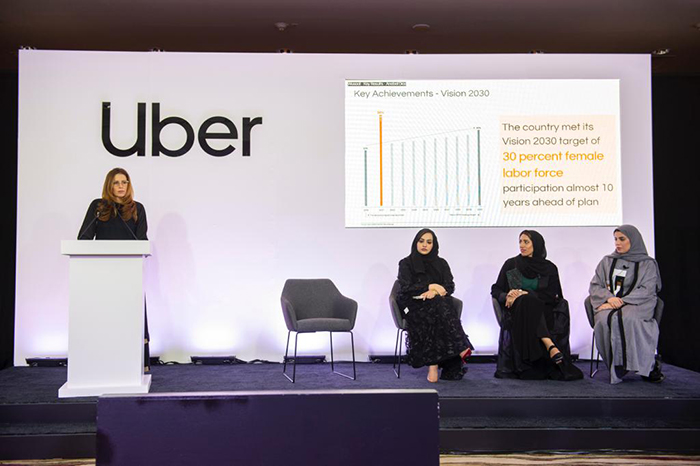Uber has announced today the results of a recently-commissioned study to measure the 4-year impact of the “Wusool” program, an enhanced mobility partnership that was co-launched with Saudi Human Resources Development Fund (HRDF) in Saudi Arabia in 2017 to make transport more accessible to women going to work. The program proved to be highly successful in empowering working Saudi women.
The program is funded by HRDF and operated by Takamol Holdings, and aims to increase female participation in the private work force in line with the goals of the Saudi Vision 2030 by addressing local mobility challenges through affordable subsidized transportation requested through the Uber app, and eventually through other ride-sharing applications. The private-public collaboration is Uber’s largest subsidy program, and one of the largest government partnerships globally.
Conducted by Roland Berger, a leading global consulting firm of European origin, the study revealed the success and key achievements the Wusool program, including:
- With the help of Wusool, female participation in Saudi Arabia’s labor force grew between 2018 and 2021- from around 22% to almost 36%. The substantial increase means that the country has met its Vision 2030 targetof 30% female labor force participation almost 10 years ahead of schedule.
- Employment retention: 88% of users remained in employment after being registered with Wusool for a year.
- Almost 80% of respondents who were previously reliant on public transport, agreed that Wusool enabled them to access more and better employment opportunities
- 21% noted that the program increased their job security
- The program’s main benefit to 49% of participants was saving money, and now felt financially independent.
- The number of women benefiting from Wusool increased from 300 to around 13,000 in only the first year of operation.
- By late 2021, more than 120,000 women had used Wusool to take more than 20 million trips to/from their workplace, largely via the Uber app.
Mohammad Gazzaz, General Manager of Uber Saudi Arabia, said, “We are very pleased to announce the tangible impact that Wusool is making in empowering women in Saudi Arabia. Programs like Wusool are an important driver of Saudi Arabia exceeding its female labor force participation goals under the Vision 2030, and we’re proud that the Uber platform has played a key role to achieve this. We remain committed to female empowerment in the Kingdom, and are running a host of initiatives to expand economic opportunities for women.”
Turki Al-Jawani, Director General of the HDRF, said, “With the Kingdom’s 2030 Vision’s focus on increasing women’s participation in the labor force, we have launched programs that enable women to join the labor market and then remain a part of it. Wusool has been successful in addressing the issue of transportation, which is a key challenge to employment continuity, particularly for entry-level women workers. The Fund’s multiple initiatives under the National Transformation Program helped boost women’s participation in the economy to over 30% by mid-2021.”
Ahmad Al-Yamani, CEO of Takamol Holding said, “The impact of Wusool on increasing job retention for Saudi female employees has been immense. The program was created to meet the needs of working women for flexible and affordable transportation. We remain committed to introducing initiatives that empower working women in achieving their ambitions and aspirations.”
Wusool beneficiaries are expected to grow further in 2022 to cross 150,000 by year-end. Plans are also underway for Wusool to expand into carpooling services.
Uber has consistently focused on women empowerment in Saudi Arabia. A key company initiative in the country is “Masaruky”, which translates to “Your Path”. The initiative has seen Uber pledge over SAR 1,000,000 (USD 266,500) to support women drivers and enable them to access flexible economic opportunities more easily, such as driving using the Uber app.


COMMENTS